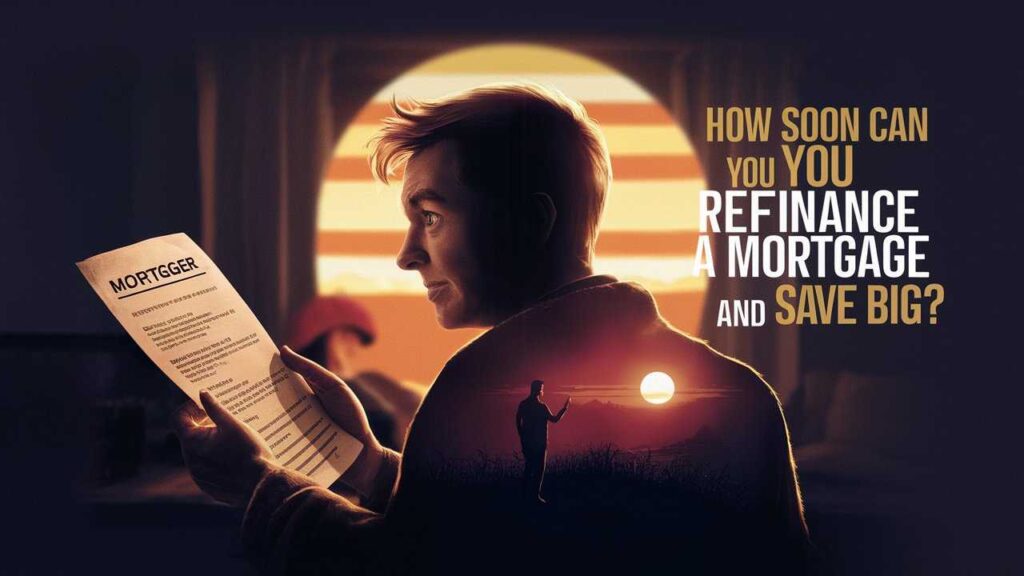The Great Refinance Dilemma: Timing vs. Savings
You’ve finally crossed the finish line, keys to your dream home jingling in hand, and now you hear whispers of refinancing. It’s tempting, right? Dropping your monthly payments or shaving years off your mortgage sounds like magic. But then the real dilemma smacks you in the face: how soon is too soon to jump back into the deep end of the refinancing pool? It’s like spotting a sale at your favorite store💴buy now or wait for a bigger discount? Timing is everything, but so is saving big bucks. Let’s unravel this sticky puzzle and find out when you should make your move.

Why Refinancing Could Be Your Wallet’s New Best Friend
Refinancing is like that friend who tells you where to get free coffee and how to dodge traffic. It’s not just about lowering your interest rate (though that’s a delicious cherry on top), it’s about giving your wallet a little breathing room. Imagine slashing hundreds off your monthly payments or cutting down your loan term from 30 years to 15. Refinancing, done right, could save you a small fortune, or as I like to call it💴vacation money.
Taking in Refinancing Basics
What Does It Mean to Refinance a Mortgage? (In Non-Boring Terms)
In layman’s terms, refinancing is just getting a new mortgage to replace the old one. You’re essentially trading your current mortgage for a newer, hopefully better one. It’s like upgrading your phone💴only instead of a better camera, you’re aiming for better rates, terms, or monthly payments. Simple enough, right? But the devil is in the details. Just like picking the perfect coffee order (iced mocha or flat white?), choosing the right refinance deal requires a bit of finesse.
How Soon Is Too Soon to Refinance? Is There a Magic Number?
Is there some golden rule that says, “Thou shalt not refinance before X months”? Well, not exactly. Some experts suggest waiting at least six months after closing your first mortgage before even considering a refinance. But it’s not just about a timeframe💴it’s about whether you’re ready to play the long game. If rates have dropped dramatically or you’ve seen a financial boost, sooner might be better than later. In other words, don’t focus too much on time, but on the numbers.
The “Break-Even” Point: When Does Refinancing Start to Pay Off?
The break-even point is the holy grail of refinancing💴it’s that sweet spot where the savings from lower monthly payments outweigh the costs of the refinance itself (hello, closing fees!). If you don’t reach this magical point, you could end up spending more than you save, which kind of defeats the purpose. The break-even calculation depends on how much you’re saving per month versus how much you shelled out in upfront costs. It’s like waiting for pizza delivery💴you want it fast, but not so fast that it’s still cold when it arrives.

The Waiting Game: When Can You Refinance?
Do You Really Have to Wait? Debunking Common Myths
You might’ve heard that you absolutely must wait a certain amount of time before refinancing. This is one of those myths that’s made its way around the internet like bad dance trends. While some lenders have a “seasoning period” (yes, that’s an actual term), meaning you may need to wait 6 to 12 months, it’s not a universal rule. If you’re eager to refinance and the numbers make sense, you don’t necessarily have to twiddle your thumbs for a year. 💴The real secret? Talk to your lender and read the fine print.
Fresh Out of Closing: How Soon Can You Refinance After Your First Mortgage?
So, you’ve just closed on your mortgage and now you’re eyeing those refinancing ads that popped up in your feed (yes, your phone is listening). Some lenders allow refinancing almost immediately after closing, while others may require a waiting period of 120 days or more. It all depends on the lender, the type of loan, and whether or not you have a prepayment penalty lurking in your mortgage agreement. The good news is, refinancing quickly isn’t illegal💴it just might take a little legwork.
The Sneaky Prepayment Penalty: Is It Lurking in Your Mortgage?
Ah, the prepayment penalty💴the sneaky fee that rears its head when you least expect it. Some lenders, like overprotective helicopter parents, don’t want you to pay off your loan too early. Why? Because they lose out on interest. So, they throw in a prepayment penalty to keep you tethered. Before you refinance, check your loan documents to make sure you’re not setting yourself up for a costly surprise.
How Different Lenders Handle Refinance Timing (And How to Outsmart Them)
Lenders are like dating apps💴each one has its quirks. Some will let you refinance the day after you close, while others have a 180-day waiting period. And don’t forget that credit unions and online lenders often have different rules from big banks. Do your homework, compare rates, and be ready to ask some uncomfortable questions. Outsmart the system by finding a lender who’s willing to work within your timeline.

Is Refinancing Worth It? Let’s Talk Savings
How Much Can You Really Save by Refinancing Early?
The big question on everyone’s mind💴how much can you actually save? If rates have dropped by even a half-percent, you could save tens of thousands over the life of your loan. But beware: refinancing isn’t a magical cure-all. Calculate your potential savings, subtract the closing costs, and make sure the math checks out before pulling the trigger.
The Interest Rate Game: Why Lower Rates Aren’t Always Guaranteed
You’ve been eyeing those tantalizingly low interest rates plastered across every finance website, but here’s the catch: they’re not guaranteed. Your actual rate depends on your credit score, loan-to-value ratio, and even your debt-to-income ratio. It’s like trying to grab that last piece of cake at a party💴just because you see it doesn’t mean you’ll get it.
Closing Costs: The Silent Saboteur of Your Refinance Dreams
Closing costs are the sneaky expenses that can turn your dream refinance into a budget-busting nightmare. Expect to pay 2-5% of your loan amount in closing costs💴yep, it’s that much. If you’re not careful, these fees can eat up all the savings from your lower monthly payments. But here’s the hack: some lenders offer “no-closing-cost” refinance options, rolling the fees into your loan balance. Just make sure you know what you’re signing up for.
Refinancing to Shorten Your Loan Term: Saving Big in Less Time
Who wouldn’t want to pay off their mortgage faster? Refinancing to a shorter term can save you a ton of interest in the long run, and that’s where the real savings pile up. If you’re currently on a 30-year mortgage, switching to a 15-year could mean paying off your loan faster while saving thousands💴if you can handle the higher monthly payments.

Refinance Options: What’s On the Table?
Rate-and-Term Refinance: The Classic Move
This is your bread-and-butter refinance option. You’re changing the interest rate or the term (or both) without taking any cash out. It’s like rearranging your furniture for a better layout💴it doesn’t add space, but it makes the room feel brand new. Perfect if you’re hunting for lower monthly payments or want to pay off your loan faster.
Cash-Out Refinance: When Your Home Becomes Your ATM
A cash-out refinance allows you to pull equity out of your home as cash, and it’s tempting💴like an ATM, but with much higher stakes. Whether you’re consolidating debt or renovating your kitchen, just remember that this option increases your loan balance. It’s a double-edged sword: you get immediate cash, but you might be paying for it over the next 30 years.
Streamline Refinance: The Quick and Easy Route (No, Really)
Not all refinancing options are complicated. The streamline refinance lives up to its name💴less paperwork, fewer headaches. Typically available for FHA or VA loans, this option is fast, efficient, and doesn’t require a full credit check or appraisal. Think of it as refinancing with training wheels.
The Timing Sweet Spot: When Refinancing Makes the Most Sense
Waiting for That Perfect Rate Drop: How Long is Too Long?
You’ve got one eye on the stock market and the other on mortgage rates. But waiting for the perfect rate drop is like waiting for a shooting star💴it might happen, but not when you’re watching. If rates are already low enough to save you money, don’t wait too long. Timing the market rarely works in your favor.
Should You Refinance Right After a Major Life Event? (Spoiler: Maybe)
New job? Divorce? Baby on the way? Major life changes often come with financial shifts. Refinancing could help ease the burden of a growing family or make things more manageable after a job loss. It’s not a blanket recommendation, but for many, it’s worth a look. Just make sure the numbers line up.
How Long to Wait After a Refinance to Refinance Again (It’s a Thing)
Believe it or not, you can refinance more than once. There’s no hard-and-fast rule, but generally, if rates drop significantly or your financial situation changes, it’s worth considering. Some lenders may have a waiting period (often around 6 months), but if you see an opportunity, don’t be afraid to take the plunge💴again.

Your Credit Score vs. Refinance: A Love-Hate Relationship
How Soon Can You Refinance with Bad Credit? (And Should You?)
Bad credit doesn’t mean you’re stuck with your current mortgage forever, but it does make refinancing more challenging. Some lenders offer bad-credit refinance options, though they come with higher interest rates. The real question: should you? Only if the savings outweigh the costs. Otherwise, it’s smarter to work on boosting your score first.
Why Your Credit Score Might Be the Key to Unlocking Savings
Your credit score is the golden ticket to better interest rates. The higher your score, the better the rates lenders will offer you. A few points difference in your score could save you thousands over the life of your loan. Keep an eye on that FICO score💴it might just be your ticket to major savings.
Credit Score Hacks to Speed Up Your Refinancing Plans
If your credit score needs a little TLC before you refinance, don’t worry. Pay down credit card balances, avoid opening new accounts, and make sure your credit report is error-free. These hacks can help bump your score up in a matter of months, making you a more attractive candidate for refinancing.

Pitfalls to Avoid When Refinancing Too Soon
The Cost of Refinancing Too Early: Beware the Trap
Refinancing too early can be a trap if you don’t factor in the costs. Those shiny new rates might look great, but if the closing costs eat up all your savings, what’s the point? Always calculate the break-even point before you leap.
How to Avoid Overpaying on Closing Costs When Refinancing
Closing costs are sneaky, but they don’t have to catch you off guard. Shop around, negotiate with lenders, and don’t be afraid to ask for fee waivers. Remember, you have the power to control these costs, so use it.
Why Timing Isn’t Everything: What Else to Consider
While timing is crucial, it’s not the only thing that matters. Your personal financial goals, the length of time you plan to stay in your home, and even the type of loan you have should all factor into your decision. Refinancing is a big commitment, so make sure you’re looking at the full picture.💴

Conclusion
Refinancing Sooner Than You Think: Is It Time to Make Your Move?
So, should you refinance sooner than you thought? Maybe. If the rates are right, your credit score is solid, and you’ve done the math, there’s no reason to wait. Refinancing can be a smart way to save big, but only if you’re strategic about it.💴
The Road to Mortgage Freedom: Saving Big Starts Now!
The road to mortgage freedom starts with smart decisions, and refinancing could be your golden ticket. Whether you’re shaving years off your loan or cutting down your monthly payments, the time to act might be now. Just remember, every situation is unique💴so crunch the numbers and choose wisely.
People Also Ask
Who has the best refinance rates for cars?
Car refinance rates vary depending on your credit score, loan amount, and market conditions. As of now, some popular lenders known for competitive car refinance rates include LightStream, Bank of America, and Capital One. Credit unions like Navy Federal or PenFed often offer lower rates compared to traditional banks.
Does refinancing a car hurt your credit?
Refinancing a car can temporarily lower your credit score, but not by much. This happens because a lender runs a hard inquiry on your credit report when you apply. However, if you make payments on time with the new loan, your score could improve over time.
How do I refinance my car?
Refinancing your car is simple:
- Check your credit score to see if you qualify for better rates.
- Shop around for lenders offering competitive rates.
- Apply for pre-approval and submit the required documents like proof of income and your current loan details.
- If approved, the new lender will pay off your old loan, and you’ll start making payments under the new terms.
Which bank is best for refinancing?
Some top banks for refinancing include Bank of America, Chase, and Wells Fargo, all of which offer competitive rates and flexible terms. However, you may want to consider credit unions like Alliant Credit Union or DCU, which often provide lower interest rates compared to traditional banks.
What’s better than refinancing?
If refinancing isn’t the best option for you, other alternatives might include:
- Loan modification: You could negotiate new terms with your current lender without taking out a new loan.
- Extra payments: If you can afford it, making additional payments on your current loan can reduce the principal faster.
- Debt consolidation: If you have multiple debts, consolidating them might offer a better overall financial strategy than refinancing your car alone.
What is the best company to use for a refinance?
Top companies for car refinancing include LightStream, AutoPay, RateGenius, and RefiJet. These companies are often praised for their easy application process, competitive rates, and flexible terms.
Can I refinance with the same bank?
Yes, many lenders allow you to refinance with the same bank, though it’s not always the best deal. Your current lender might offer loyalty discounts, but it’s still a good idea to compare offers from other lenders to ensure you’re getting the best rate.
How much will my credit drop if I refinance my car?
A hard credit inquiry from refinancing might lower your credit score by about 5-10 points. However, this dip is usually temporary, and making consistent payments on the new loan can help improve your credit in the long run.
Is refinancing worth it?
Refinancing is worth it if you can secure a lower interest rate, reduce your monthly payment, or shorten your loan term without incurring high fees. Always calculate how much you’ll save in interest versus how much it will cost to refinance.
Does credit score matter when refinancing?
Yes, your credit score significantly impacts the rate and terms you’ll be offered when refinancing. A higher score can help you secure lower interest rates, while a lower score may lead to higher rates or loan rejection.
What is a good APR for a car?
A good APR for a car loan typically ranges from 2% to 5%, depending on your credit score and whether it’s a new or used vehicle. Anything below 3% is generally considered excellent for new cars, while rates for used cars might hover slightly higher.
Who has the lowest car loan rates right now?
Credit unions like PenFed and Navy Federal typically offer some of the lowest car loan rates, often beating out traditional banks. Online lenders like LightStream also have competitive rates, especially for borrowers with excellent credit.
How does refinance work?
Refinancing a car involves taking out a new loan with better terms to pay off your existing one. The new lender pays off the old loan, and you make payments to the new lender under the new agreement, ideally at a lower interest rate or with a better repayment term.
What are the best car refinance companies?
Top-rated car refinance companies include:
- LightStream (for high-credit borrowers)
- AutoPay (flexible terms)
- RateGenius (large network of lenders)
- RefiJet (easy application process)
How much is refinancing cost?
Refinancing a car typically involves minimal costs, but some lenders may charge origination fees or title transfer fees. Expect to pay between $75 to $200 depending on your lender and state regulations.
What is today’s refinance rate?
Refinance rates fluctuate daily and depend on factors like your credit score, loan-to-value ratio, and term length. Rates currently range from 2.5% to 7%, but it’s best to check with individual lenders for today’s specific offers.
Why is it so hard to refinance?
Refinancing can feel difficult if your credit score isn’t high enough, your car has depreciated significantly, or if you’re still early in your loan term. Lenders may also hesitate to refinance if the remaining balance on your loan is too small or if the car is too old.









